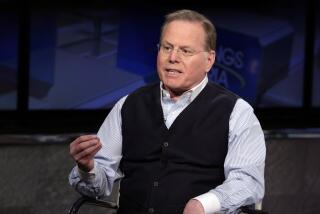AT&T; Poised to Reap Benefits From NCR Deal
- Share via
After about eight years and more than $10 billion, American Telephone & Telegraph may be ready to realize its dream of becoming a major force in the computer industry.
As the telephone giant prepares to mark the first anniversary of its $7.5-billion acquisition of computer maker NCR Corp. next week, once-skeptical analysts are proclaiming the deal a startling success.
The deal, still the largest of its kind in the high-tech industry, has gone so well that AT&T; is now positioned to emerge as a key player in the global market for telecommunications-based computing, analysts say.
Not only is NCR--now an AT&T; subsidiary--one of just a handful of companies offering a full range of computers capable of working with other manufacturers’ computer systems, the company is now linking up those computers with AT&T;’s sophisticated long-distance phone network to help businesses tie together their far-flung operations, analysts say.
“This is better than I ever expected,” said Craig Ellis, telecommunications analyst at Wheat, First Securities in Richmond, Va.
Before it launched its initially hostile bid for NCR--then the nation’s sixth-largest computer maker--AT&T; had lost about $3 billion over seven years trying to create its own in-house computer company. The move on NCR was seen as a last-ditch effort to grab the dream that had proven so elusive.
If the AT&T-NCR; deal continues on its current course, it will likely stand out as the most successful corporate combination in the high-tech industry, a field littered with failed attempts to blend fast-track technologies and disparate corporate cultures. And the deal, whose hallmark so far has been AT&T;’s hands-off approach to its new subsidiary, is likely to set a pattern for similar acquisitions in the future.
“We had a lot of doubters when we started, and even when we completed there were still questions about the strategic wisdom of this,” said AT&T; Chairman Robert E. Allen, whose legacy at Ma Bell may well depend on the outcome of this new venture. “But we’ve been able to convince almost everyone that it makes sense. Now the only remaining question is whether we can continue to execute.”
Although the early assessment is largely positive, AT&T; still is far from assured of its goal of blending its world-class telecommunications expertise with computing know-how to produce the networks of interlinked, sophisticated computers that businesses are increasingly demanding. But the company is a lot closer than it has ever been before.
“This is no slam dunk,” said Wesley Melling, a computer analyst at Gartner Group in Westport, Conn. “But AT&T; now has all the parts to put together what it needs to be.”
Analysts say the significant challenges still facing AT&T;’s NCR subsidiary include developing more sophisticated software programs and creating crash-proof computer systems.
The company must also start showing some rising sales and increasing profits.
According to NCR, its sales in 1992--a year in which revenue for the entire computer industry is expected to fall at least 5%--are running even with those of a year ago at $7.5 billion. That figure includes NCR’s $6 billion, $1 billion from AT&T; and $500 million generated by Teradata, an El Segundo-based computer maker that NCR acquired earlier this year. AT&T; said NCR is making money, but it won’t say how much.
Gil Williamson, a 20-year NCR veteran and now its chairman, acknowledged that being a part of AT&T; has not changed life very much around the computer maker’s Dayton, Ohio, headquarters.
“We’re still following NCR’s product strategy. Our people are in charge,” Williamson said. “NCR has pretty much the same business as before.
AT&T; Answers the Skeptics
When AT&T; announced that it was acquiring NCR, skeptics within the industry questioned the wisdom of the deal. In a recent interview, AT&T; Chairman Robert E. Allen discussed some of those issues:
Skeptics: High-tech mergers are risky and doomed to problems, even failure.
Allen: “A lot of mergers do fail, but I have absolutely no reason to believe this merger will. We have passed the test of the first year. . . . We are more than pleased with our progress.”
Skeptics: AT&T;’s purchase of NCR is a $7.5-billion solution to a $2-billion problem.
Allen: “I hear from large customers that we now have doors opened to us that weren’t before because they see that we have made a commitment to computing. Before, they didn’t see us as a long-term player and wouldn’t even consider us.”
Skeptics: The interrelationship between traditional telephone communications and computing is overblown and theoretical.
Allen: “These industries are coming together, and everyone can see it. Our competitors, like IBM, are doing the same thing we are, but they are coming at it from the opposite end. . . . We have a healthy computer company and a thriving communications business. Our customers need this integrated approach.”
Skeptics: NCR is a second-rank computer company. Who needs it?
Allen: “NCR is profitable. We haven’t been able to say that before about our computer operations.”






